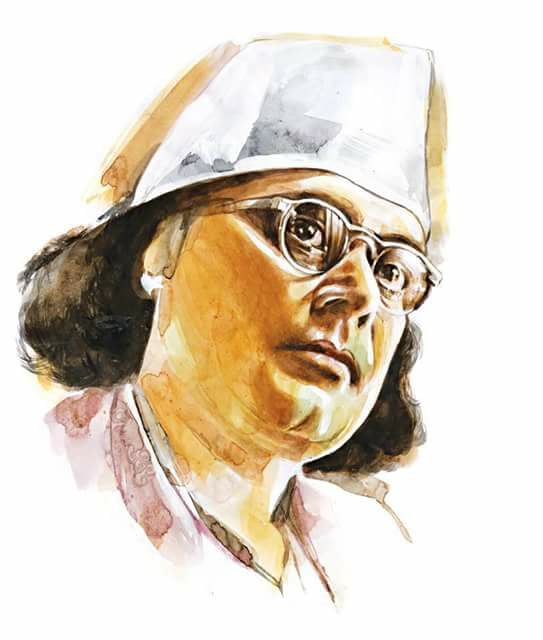Arise! Prisoners of Hunger
Jago Anashana Bandi Otho Re Joto
(An English translation of Kazi Nazrul Islam's Bengali version of
The Internationale from 1927)
[Current translation by and copyright Monish R Chatterjee (2024)]
Arise! Ye prisoners of hunger, rise up,
all
All Ye tormented and bereft of fortune--Arise!
Smiting every last knock with a mighty thunderbolt
Roars the booming voice of the trampled and
oppressed
Reborn today, a peerless new world--behold,
yonder arrived.
Chains, these, of habit and ritual, they bind and hold us back Roots they are, of our misfortune, we shall smash them all. Shattering those mighty prison walls, break free, all Ye destitutes None shall ever again remain trampled underfoot of tyranny.
From the depths of a new foundation Rejuvenant- Phoenix-like, shall arise a youthful new world Listen Ye tyrant! Listen, Ye hoarder, Ye heartless profiteer! Paupers we were yesterday, We, Universal Victors of tomorrow. Hark warriors, at this final battlefield for your rights Stand upright, my brothers, stand for all that is rightfully yours
Solidarity this, from the heart of all the people Solidarity this, of the Internationale Ensign it shall be, of ever-free Humanity!!
[The Bengali version of the history-making freedom song, the anthem of the oppressed, The Internationale, originally written by Eugène Pottier of the Paris Commune, was composed during the progressively intensifying freedom movement in India against the British colonial occupation of the sub-continent in the early 1900s. As the links provided in this write-up will illustrate, this masterful Bengali translation, along with the attendant musical composition, was a result of the co-Founder of the Communist Party of India, Muzaffar Ahmad (1889-1973), approaching the poet, composer and versatile literary genius, Kazi Nazrul Islam (1899-1976), in 1927, and requesting that Nazrul create a Bengali version of The Internationale. The result was this exquisite poem/song, which included contextual aspects pertinent to the Indian struggle. Nazrul liberally uses such Bengali words for oppressed and socially disinherited people as sarbahara, sanhati, sangram, sanchayi, nipirita- words which have defined progressive and anti-imperialist movements in Bengal and equivalently elsewhere in India.
[For this author (MRC), this song had somehow maintained a connection (because of its early connection to the cause of "prisoners on hungerstrike" in protest against injustice within and outside prisons). This author was convinced since childhood that Kazi Nazrul likely wrote this song in solidarity with the famous hunger strike by the young Jatin Das (1904-1929) in Lahore Central Jail, leading to his death (an antecedent to the Bobby Sands (1954-1981) incident in the Northern Ireland conflict). It was only later that MRC has discovered that Kazi Nazrul's translation occurred in 1927--2 years prior to the Jatin Das martyrdom. Nevertheless, the song itself resonates rather well with the stories of political prisoners and indeed martyrs from the Indian freedom movement around approximately the same time period. Nazrul, who was a highly creative and inspired literary disciple of Rabindranath Tagore, wrote a great many stirring songs with rhythmic, militant beats dedicated to the Indian freedom fighters. These songs created unmatched fervor among thousands of Indian/Bengali youth who entered the campaigns for freedom and social justice. His poem Bidrohi (The Rebel) forever enshrined Kazi Nazrul (whose creative versatility went far beyond his revolutionary poems) as the pre-eminent literary voice of the Indian anti-colonial, anti-imperial movement in Bengal. More details pertinent to the evolution and emergence of Kazi Nazrul's contribution to the translation of The Internationale may be found in the related link within the "Bengali translation" section from Wikipedia. Monish R Chatterjee]
Notes:
What follows is a further discussion related to The Internationale as it appears in Wikipedia. For a long time, MRC had wanted to translate the stunningly beautiful Bengali version of "The Internationale" back into English. As indicated earlier, the Bengali version was written by none other than Kazi Nazrul Islam, one of MRC's favorite Bengali poets, musicians and composers (perhaps next only to Rabindranath Tagore). Of course, upon perusing Google, it is found that the French original of this epochal song has been translated into myriad languages, and it is special that Bengali is one of them. Since one or more English versions are extant, translating the same from the Bengali may appear redundant. However, upon further consideration, the current author has created this translation, since the Bengali version has contextual novelties created by Kazi Nazrul, some of which have been discussed above.
MRC has incorporated some extensions to the portion of The Internationale in Wikipedia on the Bengali version. Also added is the Bengali song related to Nazrul's composition, sung originally by Satya Chowdhury. Here are the links to the Wiki page with the Bengali entry. Also excerpted here is the Bengali portion with MRC's edits.
Click Here[From Wiki]
Bengali translation
[edit]
"The Internationale" was first translated to Bengali by the rebel poet Kazi Nazrul Islam. Nazrul, who was greatly inspired by the tenets of Socialism and its relevance to India under British colonial occupation, authored numerous poems in Bengali highlighting socio-political issues, including gender and economic inequities, and social justice overall. Around 1927, Nazrul (already an established poet and composer) was approached by Muzaffar Ahmad, one of the Founders of the Communist Party of India, requesting that he translate the celebrated song into Bengali. While it maintains the essential theme of the original (via the English version), Nazrul skillfully inserted salient social issues into it within the Indian context. It was also translated by Hemanga Biswas[73] and Mohit Banerji, that was subsequently adopted by West Bengal's Left Front[74]. Here is the Bengali audio version, performed by Satya Chowdhury[75]. Appended below are the Bengali lyrics written by Kazi Nazrul Islam: [76].
For Satya Chowdhury's Bengali rendition, please follow the ref. [75] in Wiki (link provided by me), or peruse this link:
Click Here(Article changed on May 18, 2024 at 5:25 PM EDT)
(Article changed on May 18, 2024 at 5:45 PM EDT)
(Article changed on May 18, 2024 at 5:55 PM EDT)






